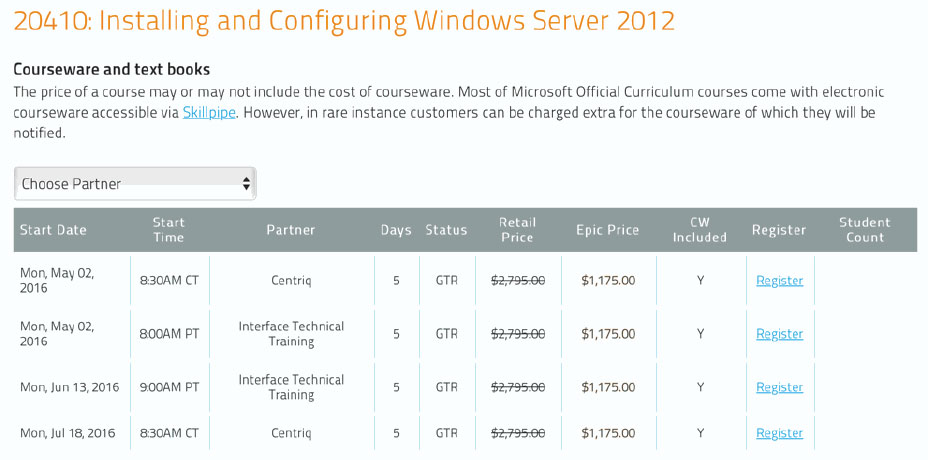ITIL-SS: ITIL Intermediate Service Lifecycle: Service Strategy with Certification Exam
About this Course
The ITIL® Intermediate Qualification: Service Strategy Certificate is a free-standing qualification but is also part of the ITIL® intermediate lifecycle stream, and one of the modules that leads to the ITIL® Expert Certificate in IT Service Management. The purpose of this training module and the associated exam and certificate is, respectively, to impart, test, and validate the knowledge on industry practices in service management and strategy as documented in the ITIL® Service Strategy publication. The course covers the management-level concepts and core information of the supporting activities within service strategy, but not specific details about each of the supporting processes.
Audience Profile
The main target candidate for the ITIL® Intermediate Qualification: Service Strategy Certificate includes, but is not restricted to:
- Chief information officers (CIOs)
- Chief technology officers (CTOs)
- Managers
- Supervisory staff
- Team leaders
- Service designers
- IT architects
- IT planners
- IT consultants
- IT audit managers
- IT security managers
- ITSM trainers involved in the on-going management, co-ordination and integration of strategizing activities within the service lifecycle
- Individuals who require a deeper understanding of the ITIL® service strategy stage of the ITIL® service lifecycle and how activities in it may be implemented to enhance the quality of IT service management within an organization
- IT professionals working in roles associated with strategic planning, execution and control within a service-based business model, seeking an understanding of the concepts, processes, functions and activities involved in service strategy
- Individuals who have attained the ITIL® Foundation Certificate in IT Service Management and wish to advance to higher level ITIL® certifications
- Individuals seeking the ITIL® Expert Certification in IT Service Management for which this qualification can be one of the prerequisite modules
- Individuals seeking progress toward the ITIL® Master Certificate in IT Service Management for which the ITIL® Expert is a prerequisite.
At Course Completion
This qualification provides a complete overview of service strategy including all its related activities: how to design, develop, and implement service management not only as an organizational capability but also as a strategic asset.
Candidates can expect to gain competencies in the following upon successful completion of the education and examination components related to this certification:
- Introduction to service strategy
- Service strategy principles
- Service strategy processes
- Governance
- Organizing for service strategy
- Technology considerations
- Implementing service strategy
- Challenges, critical success factors and risks.
In addition, the training for this certification should include examination preparation, including a mock examination opportunity.
Outline
Learning Unit SS01: Introduction to service strategy
Bloom’s Level 2 Objectives – Full understanding of service strategy terms and core concepts.
- The purpose, goals and objectives of service strategy
- The scope of service strategy
- The value to the business
- The context of service strategy in relation to all other lifecycle stages.
Learning Unit SS02: Service strategy principles
Bloom’s Level 4 Objectives – The knowledge, interpretation and analysis of service strategy principles, techniques and relationships and their application for creation of effective service strategies.
- The ability to decide on a service strategy
- How to utilize the four P’s of service strategy
- How to define services, create value and leverage the combined use of utility and warranty
- How to use service economics and sourcing strategies when meeting business outcomes.
Learning Unit SS03: Service strategy processes
Bloom’s Level 4 Objectives – The knowledge, interpretation and analysis of service strategy principles, techniques and relationships and their application for creation of effective service strategies.
- The management level concepts for the five service strategy processes and how they flow and integrate with the lifecycle The purpose, scope and objectives of each service strategy process and how they link to value for the business.
Learning Unit SS04: Governance
Bloom’s Level 4 Objectives – The knowledge, interpretation and analysis of service strategy principles, techniques and relationships and their application for creation of effective service strategies.
- The ability to analyze IT governance and use it to set strategy by leveraging governance frameworks, bodies.
Learning Unit SS05: Organizing for service strategy
Bloom’s Level 4 Objectives – The knowledge, interpretation and analysis of service strategy principles, techniques and relationships and their application for creation of effective service strategies.
- The ability to create an organizational design using the relevant development and departmental methods.
Learning Unit SS06: Technology considerations
Bloom’s Level 4 Objectives – The knowledge, interpretation and analysis of service strategy principles, techniques and relationships and their application for creation of effective service strategies.
- Understand the relevance and opportunities for service automation and the importance and application of technology interfaces across the lifecycle.
Learning Unit SS07: Implementing service strategy
Bloom’s Level 4 Objectives – The knowledge, interpretation and analysis of service strategy principles, techniques and relationships and their application for creation of effective service strategies.
- Develop implementation strategies that follow a lifecycle approach (e.g. design, transition, operation and improvement, programs).
Learning Unit SS08: Challenges, critical success factors and risks
Bloom’s Level 4 Objectives – The knowledge, interpretation and analysis of service strategy principles, techniques and relationships and their application for creation of effective service strategies.
- The ability to provide insight and guidance for strategic challenges, risks and critical success factors.
Prerequisites
Candidates wishing to be trained and examined for this qualification must already hold the ITIL® Foundation Certificate in IT Service Management which must be presented as documentary evidence to gain admission Candidates who hold the following ITIL® qualifications are also eligible, and similar evidence will be required:
- Earlier ITIL® (V2) Foundation plus Foundation Bridge
- ITIL Expert Certificate in IT Service Management (achieved via Service Manager or Practitioner bridging routes).

